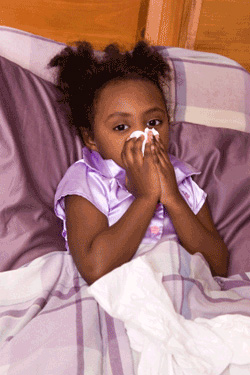When does my child need antibiotics?
Checkup on Health
By Michael C. Lucien, M.D., M.P.H.
Dr. Lucien is a pediatrician at UC Davis Medical Center in Sacramento.
Imagine that your child has had three days of a cough, fever, runny nose and feeling just plain sick. You bring her into the doctor’s office in the hopes of receiving something to make her well. Not long ago, many doctors would have handed over a prescription for a broad-spectrum antibiotic. Maybe it would work. Conventional wisdom held that even if it didn’t, at least no harm would be done. And no matter what the treatment, the patient would probably be better in a few days.
Conventional wisdom has changed. No longer can doctors be so cavalier about dispensing antibiotics. Such practices are now known to be a real danger not only to the individual who was unnecessarily given antibiotics, but to the entire community.

Because of the overuse of antibiotics over the years, bacteria are increasingly becoming drug-resistant and much more difficult to manage. Some strains of bacteria are now resistant to almost every antibiotic now available.
The Centers for Disease Control estimate that up to half of antibiotic prescriptions written in doctor’s offices are unnecessary. They are now urging physicians to change their prescribing habits.
Some responsibility for the solution to the problem must rest with the general public. Greater understanding is key. The flu and most colds, as well as most coughs and sore throats, are due to viruses, which antibiotics are completely ineffective in fighting. Antibiotics are only useful against bacterial infections.
Which illnesses need antibiotics?
Are antibiotics ever the right solution to common childhood ailments? Of course. It’s still important to see your doctor when your child is sick for longer than a few days, especially if symptoms are serious or worsening. Here is what your doctor considers when it comes to prescribing antibiotics:
- Common colds never need antibiotics. Even those accompanied by fever and a yellow or green discharge are usually caused by viruses. You can expect symptoms to last for up to ten days. However, if a sinus infection caused by bacteria is suspected, your doctor will carefully make a decision whether antibiotics are the best choice based on symptoms and a physical examination.
- Sore throats generally do not need antibiotics. The main exception is for “strep throat,” when streptococcal infection is the cause. This can be determined in most doctors’ offices with a quick throat swab.
- Coughs are usually caused by viruses and do not often require antibiotic treatment. By listening to the lungs, the doctor can determine if pneumonia, which is a lung infection often caused by bacteria, is present. This requires antibiotics.
- Ear infections have traditionally been treated routinely in this country with antibiotics. Now we realize that about 80 percent will get better without treatment in seven to 14 days. If the child is not sick or in pain, many doctors now recommend waiting to see if the infection clears up by itself.
In-room misters and over-the-counter remedies against pain, fever, cough and congestion can help relieve symptoms and allow your child to get a good night’s sleep."—Michael C. Lucien, M.D., M.P.H.
Listening is important
In-room misters and over-the-counter remedies against pain, fever, cough and congestion can help relieve symptoms and allow your child to get a good night’s sleep. It’s important that parents don’t push doctors to prescribe antibiotic treatment. Instead, ask your doctor for advice on how you can help your child feel better. In-room misters and over-the-counter remedies against pain, fever, cough and congestion can help relieve symptoms and allow your child to get a good night’s sleep.
When your doctor does prescribe antibiotics, it is essential to use them properly. Unless your doctor advises otherwise, use all the pills according to the schedule provided.
Never save up pills after your child is feeling better so that they can be used for another child or a future illness. Taking only a partial course can lead to the growth of resistant, and much more dangerous, strains of bacteria.
An important preventive measure you can take against bacterial infections is immunizing against streptococcus pneumoniae."—Michael C. Lucien, M.D., M.P.H.
Preventative measures
An important preventive measure you can take against bacterial infections is immunizing against streptococcus pneumoniae. These infections are the most common invasive bacterial infections in children in the U.S., causing pneumonia, meningitis and blood infections. At one time, streptococcus was easy to treat with penicillin. The overuse of antibiotics has made it resistant to many drugs, and it is now responsible for 40,000 deaths annually.
Immunization against strep pneumoniae is recommended for all children, aged two months to 23 months. People over 65 years or who have a chronic illness should also be immunized with pneumococcal vaccine.



